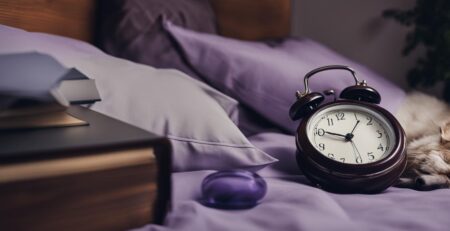Boost Your Workout Performance by Enhancing Sleep Today
Sleep plays a crucial role in athletic performance and overall health. It allows our bodies to repair and recover from physical exertion, promotes cardiovascular health, and strengthens our immune system. Quality sleep also helps with memory consolidation and cognitive function, making it essential for athletes.
Studies have shown that increasing both the quantity and quality of sleep can lead to performance improvements in various sports, such as faster running times, improved shooting accuracy, and increased serve precision in tennis players.
Key Takeaways:
- Quality sleep is crucial for athletic performance and overall health.
- Improving sleep quantity and quality can lead to performance improvements in sports.
- Adequate sleep promotes muscle recovery, memory consolidation, and cognitive function.
- Sleep deprivation can lead to decreased reaction time, decreased accuracy, and increased risk of injuries.
- Prioritizing sleep alongside training and nutrition is essential for optimizing workout effectiveness.
The Importance of Sleep for Athletes
Sleep is a vital component for athletes to perform at their best. Not only does it aid in physical recovery and muscle repair, but it also plays a crucial role in memory consolidation and cognitive function. Quality sleep is essential for athletes looking to improve their workout performance and enhance their overall athletic abilities.
When athletes do not get enough sleep, it can have detrimental effects on their performance. Sleep deprivation can result in decreased reaction time, reduced accuracy, quicker exhaustion, impaired decision-making, and an increased risk of injuries. Additionally, poor sleep quality and quantity can negatively impact an athlete's mental health, leading to irritability, anxiety, and depression.
To optimize their sleep habits and improve workout performance, athletes should prioritize getting 7-9 hours of sleep each night. Establishing a consistent sleep routine, creating a sleep-friendly environment, and practicing good sleep hygiene can also contribute to better sleep quality. By acknowledging the importance of sleep and incorporating sleep optimization strategies into their training regimen, athletes can maximize their athletic performance and reach their full potential.
The Impact of Sleep on Exercise Performance
Sleep plays a critical role in exercise performance. Adequate sleep allows the body to repair and build muscles, consolidate memories, and maintain cognitive function. Studies have shown that sleep deprivation can lead to decreased reaction time, impaired accuracy, quicker exhaustion, and an increased risk of injuries.
On the other hand, getting enough high-quality sleep can lead to improved athletic recovery, enhanced physical and mental well-being, and optimized exercise performance. Prioritizing sleep alongside training and nutrition is essential for athletes looking to maximize their workout effectiveness and achieve optimal results in their respective sports.
The Impact of Exercise on Sleep
Exercise has a significant impact on sleep quality, which in turn can boost workout effectiveness. Engaging in regular physical activity can help optimize sleep and promote better overall sleep patterns. Studies have shown that exercise reduces sleep onset time and decreases time spent awake in bed. Moderate to vigorous physical activity has been found to alleviate daytime sleepiness and reduce the need for sleep medications. Additionally, regular exercise can indirectly improve sleep by reducing the risk of weight gain and symptoms of sleep disorders such as obstructive sleep apnea.
While exercise is beneficial for sleep, it is important to find the right balance. Exercising vigorously too close to bedtime can interfere with sleep efficiency and total sleep time. It is recommended to engage in low-intensity activities like yoga, stretching, or breathing exercises before bedtime to aid in relaxation and promote better sleep quality.
“Regular exercise has been shown to improve sleep quality by reducing sleep latency and increasing sleep duration.”
By incorporating exercise into your daily routine and finding the right balance, you can optimize sleep to boost workout effectiveness. The table below summarizes the impact of exercise on sleep:
Table: The Impact of Exercise on Sleep
| Effect of Exercise on Sleep | Summary |
|---|---|
| Reduced sleep onset time | Exercise helps you fall asleep faster. |
| Decreased time spent awake in bed | Exercise can reduce nighttime awakenings. |
| Alleviated daytime sleepiness | Regular physical activity can decrease feelings of fatigue during the day. |
| Reduced risk of sleep disorders | Exercise can help reduce symptoms of sleep disorders such as sleep apnea. |
Incorporating exercise into your daily routine can promote better sleep, optimize workout performance, and contribute to overall health and well-being.
Sleep Strategies for Enhanced Workout Performance
When it comes to maximizing your workout performance, sleep plays a crucial role. By implementing effective sleep strategies, you can optimize your sleep quality and ultimately enhance your athletic abilities. Here, we will explore some key strategies to help you maximize workout performance through better sleep.
Prioritize Consistent Sleep Schedule
One of the most important sleep strategies for athletes is to maintain a consistent sleep schedule. Going to bed and waking up at the same time each day helps regulate your body's internal clock, promoting better sleep quality. Consistency allows your body to establish a sleep routine, making it easier to fall asleep and wake up feeling refreshed.
Create a Sleep-Friendly Environment
Creating a sleep-friendly environment is crucial for quality sleep. Ensure your bedroom is cool, quiet, and dark, as these factors promote better sleep. Use blackout curtains or an eye mask to block out any light, consider using earplugs or a white noise machine to minimize noise disturbances, and adjust the room temperature to a comfortable level to promote optimal sleep.
Practice Relaxation Techniques
Incorporating relaxation techniques into your bedtime routine can help you unwind and prepare your body for sleep. Consider practicing deep breathing exercises, meditation, or gentle stretching to promote relaxation and reduce any stress or tension accumulated throughout the day. These techniques can help calm your mind and prepare your body for a restful night's sleep.
| Benefits of Sleep Strategies for Workout Performance |
|---|
| Improved focus and concentration during workouts |
| Enhanced reaction time and agility |
| Increased endurance and energy levels |
| Reduced risk of injury |
By implementing these sleep strategies and prioritizing quality sleep, you can maximize your workout performance and achieve optimal results in your athletic endeavors. Remember, sleep is an essential component of your training regimen, and by giving it the attention it deserves, you can take your performance to new heights.
Sleep Strategies for Enhanced Workout Performance
Sleep optimization is crucial for athletes looking to maximize their workout effectiveness. Quality sleep plays a vital role in muscle recovery, cognitive function, and overall health and well-being. By implementing sleep strategies, athletes can improve their sleep quality and enhance their workout performance. Here are some key strategies to consider:
1. Establish a Consistent Sleep Routine
Creating a consistent sleep routine is essential for optimizing sleep. Going to bed and waking up at the same time each day helps regulate the body's internal clock, making it easier to fall asleep and wake up feeling refreshed. Aim for 7-9 hours of sleep per night and prioritize sleep just like training and nutrition.
2. Create a Sleep-Friendly Environment
Your sleep environment can significantly impact the quality of your sleep. Make sure your bedroom is cool, dark, and quiet. Consider using blackout curtains, earplugs, or a white noise machine to minimize distractions. Invest in a comfortable mattress, pillows, and bedding to promote optimal comfort and support.
3. Practice Good Sleep Hygiene
Developing healthy sleep habits can enhance your sleep quality. Avoid consuming caffeine and stimulants close to bedtime, as they can interfere with sleep. Limit exposure to electronic devices, such as smartphones and laptops, before bed, as the blue light emitted can suppress melatonin production. Engage in relaxing activities before bed, such as reading a book or taking a warm bath, to promote a calm and restful state.
4. Manage Stress and Relaxation Techniques
Stress can disrupt sleep and affect workout performance. Implement stress management techniques, such as meditation, deep breathing exercises, or journaling, to promote relaxation and a more peaceful sleep. Prioritize self-care activities, such as engaging in hobbies or spending time with loved ones, to help alleviate stress and improve overall well-being.
By incorporating these sleep strategies into your routine, you can optimize your sleep for better workout results. Remember, good sleep is a powerful tool for enhancing athletic performance and achieving your fitness goals.
The Best Time to Exercise for Better Sleep
When it comes to optimizing sleep and enhancing athletic performance, finding the best time to exercise is key. While individual preferences and schedules can vary, there are some general guidelines that can help improve sleep quality and boost your workout performance.
Exercising in the evening or late at night has been shown to promote better sleep by reducing sleep onset time and increasing deep sleep, also known as slow-wave sleep. This is the stage of sleep where the body repairs and rebuilds muscles, making it essential for athletic recovery. However, it's important to note that vigorous exercise too close to bedtime can raise core body temperature and make it more difficult to fall asleep.
To promote relaxation and better sleep quality, engaging in low-intensity activities like yoga, stretching, or breathing exercises before bed can be beneficial. These gentle exercises can help calm the mind and prepare the body for rest. Experimenting with different exercise times and listening to your body's response can help you determine the optimal time for your workouts.
“Exercising in the evening or late at night has been shown to promote better sleep by reducing sleep onset time and increasing deep sleep.”
Remember, everyone's sleep needs are different, so it's important to find a routine that works best for you. Whether you prefer to exercise in the morning, afternoon, or evening, consistency is key. By making exercise a regular part of your daily routine and prioritizing sleep alongside training and nutrition, you can enhance your athletic performance and boost your workout results.
The Impact of Sleep on Exercise Performance
Sleep plays a crucial role in optimizing exercise performance and enhancing athletic abilities. A well-rested body and mind are essential for achieving optimal results in any workout routine or sports activity. Improving sleep quality and prioritizing sleep optimization can lead to significant improvements in exercise performance. Let's explore the various ways in which sleep influences our physical capabilities and how we can maximize our workout effectiveness through better sleep.
Sleep and Reaction Time
One of the key areas where sleep has a direct impact on exercise performance is reaction time. Adequate sleep enables our brain to function optimally and respond quickly to stimuli during physical activities. Studies have shown that sleep deprivation can lead to reduced reaction times, making it harder to react swiftly in sports that require quick reflexes, such as tennis or boxing. By prioritizing sleep and ensuring we get enough quality rest, we can enhance our reaction time and perform better in challenging workout scenarios.
Sleep and Physical Endurance
Sleep also plays a vital role in improving physical endurance. When we sleep, our body goes through a recovery process that restores muscle function and aids in repairing any damage caused during exercise. Insufficient sleep can hinder this recovery process, leading to reduced endurance and increased fatigue during workouts. By optimizing our sleep habits and getting enough rest, we can enhance our physical endurance and push ourselves further in our fitness goals.
Sleep and Cognitive Function
In addition to physical performance, sleep also has a profound impact on cognitive function. Lack of sleep can impair our ability to concentrate, make decisions, and strategize effectively during workouts or sports activities. On the other hand, quality sleep promotes optimal cognitive function, enhancing our mental focus and enabling us to perform at our best. By prioritizing sleep and giving our mind the rest it needs, we can improve our cognitive abilities and achieve better workout results.
| Sleep and Exercise Performance | Impact |
|---|---|
| Reaction Time | Improves with adequate sleep |
| Physical Endurance | Enhanced by quality sleep |
| Cognitive Function | Optimized through sufficient rest |
“Sleep is the secret weapon to unlock your exercise potential. By optimizing your sleep routine, you can enhance your reaction time, improve physical endurance, and boost cognitive function. Don't underestimate the power of a good night's sleep in achieving your fitness goals.”
Optimizing Sleep for Athletes
In order to enhance athletic performance, it is crucial for athletes to prioritize sleep and optimize their sleep habits. Quality sleep plays a significant role in muscle recovery, cognitive function, and overall well-being, making it an essential component of any training routine. By making a few simple adjustments to their sleep routine, athletes can maximize their workout effectiveness and improve their athletic performance. Here are some strategies for optimizing sleep:
Create a Consistent Sleep Schedule:
Establishing a consistent sleep schedule helps regulate the body's internal clock and promotes better sleep quality. Athletes should aim to go to bed and wake up at the same time every day, even on weekends or days off. This consistency helps synchronize the body's natural sleep-wake cycle, making it easier to fall asleep and wake up feeling refreshed.
Design a Sleep-Friendly Environment:
Creating a sleep-friendly environment can significantly improve sleep quality. Athletes should make sure their bedroom is cool, quiet, and dark. Using blackout curtains, earplugs, or a white noise machine can help block out any distractions that may disrupt sleep. Additionally, investing in a comfortable mattress and pillow can make a noticeable difference in sleep quality.
Practice Good Sleep Hygiene:
Good sleep hygiene involves adopting healthy habits that promote optimal sleep. This includes avoiding caffeine and stimulants close to bedtime, limiting exposure to electronics before bed, and establishing a relaxing bedtime routine. Engaging in activities such as reading a book, taking a warm bath, or practicing relaxation techniques can help signal the body that it's time to wind down and prepare for sleep.
Optimizing sleep is a powerful tool for enhancing athletic performance. By prioritizing sleep and implementing these strategies, athletes can improve their sleep quality, recover more efficiently, and maximize their workout effectiveness. Remember, quality sleep goes hand in hand with optimal athletic performance.
Sleep Hygiene Tips for Athletes
As athletes, optimizing sleep habits is crucial to improve workout performance and achieve optimal results. Here are some sleep hygiene tips to enhance your sleep quality and boost your workout effectiveness:
1. Maintain a Consistent Sleep Schedule
Establishing a regular sleep schedule can help regulate your body's internal clock, making it easier to fall asleep and wake up at the same time each day. Aim for 7-9 hours of uninterrupted sleep, even on rest days, to ensure sufficient rest and recovery.
2. Create a Comfortable Sleep Environment
Your bedroom should be a sleep-inducing environment. Keep your room cool, dark, and quiet, and invest in a comfortable mattress and pillows that support your body while you sleep. Consider using blackout curtains, earplugs, or a white noise machine to minimize any external disruptions.
3. Limit Exposure to Electronic Devices Before Bed
Electronic devices emit blue light, which can suppress the release of melatonin, a hormone that regulates sleep. Avoid using electronic devices, such as smartphones, tablets, and laptops, at least one hour before bedtime. Instead, engage in relaxing activities, such as reading a book or practicing gentle stretches.
4. Avoid Caffeine and Stimulants Close to Bedtime
Caffeine and other stimulants can interfere with your sleep quality and make it difficult to fall asleep. Avoid consuming caffeine-containing beverages or foods, such as coffee, tea, and energy drinks, in the late afternoon or evening. Opt for herbal tea or decaffeinated options instead.
5. Engage in Relaxation Techniques
Before going to bed, incorporate relaxation techniques into your routine to promote better sleep. Try meditation, deep breathing exercises, or gentle yoga stretches to calm your mind and prepare your body for sleep. Experiment with different techniques to find what works best for you.
By adopting these sleep hygiene tips, athletes can optimize their sleep routine and improve their workout performance. Remember, sleep is an essential component of training and recovery, so prioritize quality sleep as part of your overall athletic lifestyle.
The Impact of Sleep Deprivation on Exercise
Sleep deprivation can have detrimental effects on exercise performance and overall workout effectiveness. When athletes do not get enough sleep, their physical and cognitive abilities are compromised, leading to decreased reaction time, impaired decision-making, and increased risk of injuries. Lack of sleep also affects mood and mental well-being, increasing the likelihood of irritability, anxiety, and even depression. It is crucial for athletes to prioritize adequate sleep and establish healthy sleep habits in order to optimize their workout performance.
Studies have shown that sleep deprivation can significantly impact sprint times, accuracy, and endurance. Athletes who are sleep deprived may experience quicker exhaustion and decreased overall performance during physical activities. The body's ability to repair and build muscles is also hindered by lack of sleep, leading to decreased muscle growth and delayed recovery. As a result, athletes may experience increased muscle soreness and longer recovery times between workouts.
To maximize workout performance and reduce the risk of injury, athletes should focus on improving their sleep habits. This includes maintaining a consistent sleep schedule, creating a sleep-friendly environment, and practicing relaxation techniques before bed. Limiting exposure to electronic devices and avoiding caffeine close to bedtime can also promote better sleep quality. By prioritizing sleep and implementing healthy sleep strategies, athletes can optimize their exercise performance and achieve their fitness goals.
Table: Impact of Sleep Deprivation on Exercise Performance
| Effects of Sleep Deprivation | Description |
|---|---|
| Decreased reaction time | Impaired ability to react quickly to stimuli, increasing the risk of accidents or injuries during physical activities. |
| Impaired decision-making | Difficulty making sound judgments and decisions, leading to poor exercise choices and decreased overall performance. |
| Increased risk of injuries | Lack of focus and decreased coordination can contribute to accidents and injuries during workouts or competitions. |
| Quicker exhaustion | Reduced stamina and endurance, leading to decreased performance and inability to sustain high-intensity activities. |
| Delayed muscle recovery | Prolonged muscle soreness and longer recovery times between workouts, hindering progress and overall performance. |
The Role of Sleep in Recovery and Muscle Growth
Sleep plays a crucial role in the recovery and growth of muscles. During sleep, the body goes through various processes that are essential for repairing and building muscles after physical exertion. One of these processes is the production of growth hormone, which is crucial for muscle repair and growth. Sleep also facilitates the release of testosterone, a hormone that promotes muscle development and strength.
Moreover, deep sleep, also known as slow-wave sleep, is the stage during which growth hormone is released in higher amounts. This deep sleep phase is important for muscle recovery and restoration, as it allows the body to repair damaged muscle tissue and synthesize new proteins. It is during this stage that the majority of muscle growth occurs, leading to improved physical performance and increased muscle strength.
In addition, quality sleep supports the immune system, which is crucial for recovery from intense physical activity. Lack of sleep can weaken the immune system, making athletes more susceptible to illness and infections, which can hinder their training and performance. By prioritizing sleep and ensuring an adequate sleep duration, athletes can optimize their recovery process and enhance their overall athletic performance.
In conclusion, sleep plays a vital role in the recovery and growth of muscles. It promotes the release of growth hormone, facilitates muscle repair, and supports immune function. Adequate sleep duration and quality are essential for athletes looking to maximize their workout performance and achieve optimal results in their sports. By recognizing the importance of sleep and incorporating sleep optimization strategies into their training routines, athletes can enhance their athletic performance and promote muscle growth.
Conclusion
Sleep plays a critical role in optimizing workout performance and enhancing athletic performance. Adequate sleep is essential for muscle recovery, memory consolidation, cognitive function, and overall health and well-being. Getting enough high-quality sleep can lead to improved reaction time, accuracy, endurance, and overall physical performance.
On the other hand, sleep deprivation can have detrimental effects on exercise, including decreased performance, increased risk of injury, and impaired cognitive function. By prioritizing sleep and adopting healthy sleep habits, athletes can maximize their workout effectiveness and achieve optimal performance in their respective sports.
Boosting your workout performance starts with enhancing sleep quality. So, improve exercise performance through better sleep, enhance athletic performance with quality sleep, and optimize sleep for better workout results. Remember, a well-rested body is a stronger body. Take care of your sleep, and it will take care of your performance.
FAQ
How does sleep affect athletic performance?
Sleep plays a crucial role in athletic performance by allowing the body to repair and recover from physical exertion. It promotes cardiovascular health, strengthens the immune system, and enhances memory consolidation and cognitive function.
Can improving sleep lead to performance improvements in sports?
Yes, studies have shown that increasing both the quantity and quality of sleep can lead to performance improvements in various sports. Athletes who prioritize sleep often experience faster running times, improved shooting accuracy, and increased serve precision in tennis.
How does exercise impact sleep quality?
Exercise has been shown to improve sleep quality by reducing sleep onset time and decreasing time spent awake in bed. It can also alleviate daytime sleepiness and reduce the need for sleep medications. However, exercising vigorously before bed can affect sleep efficiency and total sleep time.
What is the relationship between sleep and exercise?
Sleep and exercise have a bidirectional relationship, meaning that optimizing one can positively impact the other. Getting adequate sleep promotes healthier physical activity levels, while regular exercise can improve sleep quality and reduce sleep-related problems.
What are the benefits of exercise for sleep quality?
Regular exercise can improve sleep quality by decreasing sleep onset time and reducing wakefulness during the night. It can also help alleviate symptoms of insomnia and reduce the need for sleep medications. Exercise has been found to increase slow-wave sleep, the deep, restorative sleep phase.
What is the best time to exercise for better sleep?
The best time to exercise for better sleep may vary from person to person. Some studies suggest that exercising in the evening or late at night can promote better sleep by reducing sleep onset time and increasing slow-wave sleep. However, vigorous exercise too close to bedtime can raise core body temperature and make it more difficult to fall asleep.
How does sleep deprivation affect exercise performance?
Sleep deprivation can lead to decreased reaction time, decreased accuracy, quicker exhaustion, impaired decision-making, and an increased risk of injuries. It can also have negative effects on cognitive function, mood, and mental health.
How can athletes optimize their sleep?
Athletes can optimize their sleep by aiming for 7-9 hours of quality sleep each night, maintaining consistent sleep routines, creating a sleep-friendly environment, and practicing good sleep hygiene. It is also important to manage stress and consult with healthcare professionals for personalized sleep strategies.
What are some sleep hygiene tips for athletes?
Some sleep hygiene tips for athletes include maintaining a consistent sleep schedule, creating a comfortable sleep environment, limiting exposure to electronic devices before bed, avoiding caffeine and stimulants close to bedtime, and engaging in relaxation techniques like meditation or deep breathing exercises.
What are the effects of sleep deprivation on exercise performance?
Sleep deprivation can have detrimental effects on exercise performance, including reduced sprint times, decreased accuracy, quicker exhaustion, impaired reaction time, and increased risk of injury. It can also impair cognitive function, decision-making, and mood.
How does sleep contribute to muscle recovery and growth?
During sleep, the body produces growth hormone, which is crucial for repairing and building muscles after physical exertion. Slow-wave sleep, also known as deep sleep, is the stage during which growth hormone is released in higher amounts. Getting enough high-quality sleep promotes muscle recovery, reduces muscle soreness, and enhances athletic performance.
Source Links
- https://www.everydayhealth.com/fitness/intimate-relationship-between-fitness-sleep/
- https://www.sleepfoundation.org/physical-activity/exercise-and-sleep
- https://www.sleepfoundation.org/physical-activity/athletic-performance-and-sleep










Leave a Reply